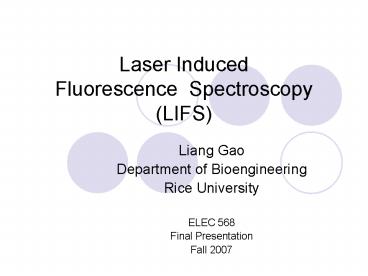Laser Induced Fluorescence Spectroscopy LIFS
1 / 20
Title: Laser Induced Fluorescence Spectroscopy LIFS
1
Laser Induced Fluorescence Spectroscopy (LIFS)
- Liang Gao
- Department of Bioengineering
- Rice University
- ELEC 568
- Final Presentation
- Fall 2007
2
Outline
- Introduction to Laser Induced Fluorescence
Spectroscopy (LIFS) - LIFS on Tissue Level
- Time-integrated spectrum
- Time-resolved spectrum
- LIFS on Molecular Level
- Fluorescent proteins
- Fluorescent contrast agents
- Imaging techniques
3
Introduction
- LIFS is a spectroscopic method used for studying
structure of molecules, detection of selective
species, and flow visualization and measurements - Excited with the help of a laser
- Wavelength is selected at species largest cross
section - In the order of few nanoseconds to microseconds,
de-excite and emit light at a wavelength larger
than the excitation wavelength - Greater sensitivity achievable because of very
low background of fluorescent signal compared to
absorption measurements
4
LIFS on Tissue Level
- Core Instruments
- Laser excitation source
- Focusing and collection optics (lenses/fiber
optics) - Spectrometer and a sensitive spectroscopic CCD
detector - Intensified Charge-Coupled Device (ICCD) is used
for time-resolved LIFS
Olaf Koschützke, LOT-Oriel Gruppe Europa.
5
Time-integrated spectrum
- Normal tissue, metaplasia, and high grade
dysplasia - 337nm and 405 nm laser excitation
- The patient had received ?-aminolevulinic acid
(ALA) prior to the investigation - ALA will be converted to the fluorescent tumour
marker with emission peak at about 635 nm
Olaf Koschützke, LOT-Oriel Gruppe Europa.
6
Time-resolved spectrum
- A basal cell carcinoma adjacent normal skin
- 405nm laser excitation
- Marker peaks 635nm, 705nm, longer lifetime
- Tissue auto fluorescence 490 nm, shorter
lifetime
Olaf Koschützke, LOT-Oriel Gruppe Europa.
7
- (a) Normal arterial wall (b) Type 2 lesion
- (c) type 4 lesion (d) type 5a lesion
Laura Marcu, 2001
8
Energy transfer on molecular level
- Fluorescence
- Stokes shift
- Fluorescence resonance energy transfer (FRET)
- Photon Switch
- Free Radical Generation
- Oxygen Radical
- Phototoxicity
- Photobleaching
- Tumor treatment
9
Green Fluorescent Protein (GFP)
- Originally isolated from the jellyfish
- Excitation Emission 395nm 475nm
- GFP has a unique can-like shape with a single
alpha helical strand containing the fluorophore
running through the center - Cyclization of Ser65Tyr66Gly67 residuals leads
to fluorophore formation
http//en.wikipedia.org/wiki/Green_Fluorescent_Pro
tein
10
- Procedures for making GFP conjugates
Images Courtesy of Vandi Bharucha, Ph.D.,
Invitrogen Inc., Jennifer Lucitti, Ph.D., and Aya
Wada Ph.D., Baylor College of Medicine
11
GFP derivatives
- Point mutations
- Spectral characteristics, photostablility,
optical crosssection, quantum yield
Shaner NC, 2005
12
HEK 293T cells
- Fluorescence resonance energy transfer (FRET)
- Genetically encoded
- GFP biosensor
- Calcium detection via Calmodulin
- 240 nM dissociation constant for calcium, range
0.1-100 µM Ca2
Images Courtesy of Vandi Bharucha, Ph.D.,
Invitrogen Inc.
13
- Adult stem cell from left atrial appendage of
pig heart stimulated with 20 uM ATP
Images Courtesy of Vandi Bharucha, Ph.D.,
Invitrogen
14
Optical Imaging Contrast Agents
- Organic fluorescent dyes
- Extensive p-conjugation
- Fluorescein isothiocyanate (FITC), reactive
derivative of fluorescein - Derivatives of Rhodamine, Coumarin and Cyanine
- Inorganic fluorescent dyes
- Quantum Dots
- Semiconductor nanostructure
- Good Tuneability
- 500-800nm Emission
- No photobleaching, high excitation
- cross-section
www.invitrogen.com
15
Optical Imaging Contrast Agents-Contd.
- Conjugates
- Antibody
- Signal tag
- Direct injection
- Problems
- Too big
- High Background
- Affect functions of the target
- Photobleaching and Phototoxicity
Howarth M, 2005
16
Images Courtesy of Tegy Vadakkan, Baylor College
of Medicine and Scott Clarke, Invitrogen.inc.
www.invitrogen.com
17
Imaging techniques
- Confocal Laser-Scanning Microscopy
- Good optical section
- Problems
- Large excitation volume
- Significant photobleaching and phototoxitity
- Limited penetration depth
- Absorption of excitation energy throughout the
beam path - Scattering of both excitation and emission
photons
MPE Tutorial, Coherent Inc, wwwo.coherent.com
18
Imaging techniques-Contd.
- Multiphoton Laser-Scanning Microscopy
- Two-photon microscopy
- Mode-locked (pulsed) lasers
- Quasi-simultaneous 10E(-18) absorption of two
photons from Near-IR laser - Approximately one million time photon density is
needed - Absence of out-of focus absorption
- IR light undergoes less scattering
MPE Tutorial, Coherent Inc, wwwo.coherent.com
19
Two-photon Laser-Scanning microscopy
MPE Tutorial, Coherent Inc, wwwo.coherent.com
20
Reference
- Lucitti JL, et. al, Vascular remodeling of the
mouse yolk sac requires hemodynamic force.
Development. 2007 Sep134(18)3317-26. - Shaner NC, Steinbach PA, Tsien RY. A guide to
choosing fluorescent proteins. Nat Methods. 2005
Dec2(12)905-9. - Howarth M, Takao K, Hayashi Y, Ting AY. Targeting
quantum dots to surface proteins in living cells
with biotin ligase. Proc Natl Acad Sci U S A.
2005 May 24102(21)7583-8 - Marcu L, et. al, Discrimination of Human Coronary
Artery Atherosclerotic Lipid-Rich Lesions, by
Time-Resolved Laser-Induced Fluorescence
Spectroscopy, Arterioscler Thromb Vasc Biol. 2001
Jul21(7)1244-50. - Olaf Koschützke, LOT-Oriel Gruppe Europa. Laser
Induced Fluorescence Spectroscopy (LIFS) - www.invitrogen.com
- www.coherent.com
- http//en.wikipedia.org/wiki/































